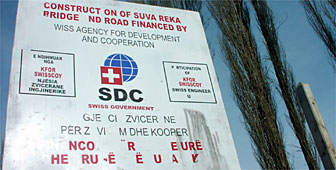Minorities live in fear in Kosovo

More than three years after Nato halted Serb repression of the ethnic Albanian majority, law enforcement remains a struggle for international authorities in Kosovo.
The province is awash with arms from the conflict and is a popular base for smugglers and other criminal gangs.
Yugoslav President Vojislav Kostunica told the United Nations General Assembly in September that Kosovo – now under UN rule – was a centre for “organised criminal networks that transit our region and stretch from central Asia to South America”.
Kosovo remains legally part of Yugoslavia, but has been run as an international protectorate since 1999.
The Nato peacekeeping force (K-For) stationed in the province is mandated to provide a safe and secure environment under UN Security Council resolution 1244.
Protected enclaves
Most of Kosovo’s Serbs have been living in heavily-guarded enclaves in fear of attacks by ethnic Albanians.
But the UN administration, UNMIK, and K-For are now trying to reduce the presence of troops in Serb villages.
“The locals like to see us around and they feel safe with that,” Squadron Leader Tony Adams, spokesman for K-For, told swissinfo.
“But we have to have a policy of unfixing as well, so we don’t have these regimented checkpoints and military personnel, and we can gradually hand over these points to UNMIK and the Kosovo Police Service.”
Unfortunately, it has proved difficult for UNMIK to recruit Serb police to the fledgling Kosovo Police Service, and minorities – particularly Serbs – are wary of approaching newly-recruited ethnic Albanian policemen.
Recent attack
Tensions remain high and the potential for violence is ever-present. At the end of August Nato-led peacekeepers and UN police came under fire from gunmen in the village of Gorazdevac, about 90 kilometres west of Pristina.
The officers were escorting a group of Serb farmers to cut wood in a local forest when they were shot at.
The situation was brought under control only after two-hour gun battle during which K-For reinforcements were called in.
Improving situation
Bob Richards, deputy commander of the international police force for the region, sees the incident as an exception to an otherwise improving security situation. But he points out that there is no room for complacency.
“Thousands of people could be tolerant and be ready to approve or forgive, but all it takes is a couple of extremists with a rifle to make an international incident… in an attempt to destabilise the situation or persuade others not to return.”
K-For’s Tony Adams agrees with this assessment, conceding that there are “hot spots” where it’s more difficult to maintain control.
“But in general it’s a question of winning the hearts and minds of the people to know that they can move around in these areas and to know that they can feel safe,” he says.
In some cases, residents of mainly Serb villages have asked for former army checkpoints to be re-instated.
Adams says that K-For consents in most cases, or else local patrols are stepped up so that people feel safe again.
Minorities still vulnerable
The Organization for Security and Cooperation in Europe (OSCE), and the UN High Commissioner for Refugees, recently carried out a comprehensive survey of the situation facing minorities in Kosovo, covering the period September 2001 to April 2002.
The report concludes that there has been a gradual improvement in security, with a continued decline in the frequency of serious acts of violence against minorities.
However, the report also notes that there is still day-to-day intimidation and harassment, as well as occasional ethnically-motivated violence, sometimes resulting in deaths.
Minorities continue to be vulnerable to attack, especially when moving outside restricted areas.
Movement restricted
The OSCE found that freedom of movement remains the fundamental issue affecting the ability of minorities to live a normal life.
And exercising this freedom continues to be highly restricted due to both the actual security situation, as well as people’s perceptions of security.
“Access to many of the essential services, employment and civil structures continues to be extremely difficult and in many cases impossible,” the report says.
The assessment concludes that general freedom of movement will only be realized when any minority can travel to any location, including urban centres, without special escort arrangements and without fear of harassment or violence.
swissinfo, Julie Hunt
The province is awash with arms from the conflict.
It is a popular base for smugglers and other criminal gangs.
Serbs have been living in K-For guarded enclaves.
Minorities still suffer intimidation and harassment.
Freedom of movement for minorities remains difficult

In compliance with the JTI standards
More: SWI swissinfo.ch certified by the Journalism Trust Initiative











You can find an overview of ongoing debates with our journalists here . Please join us!
If you want to start a conversation about a topic raised in this article or want to report factual errors, email us at english@swissinfo.ch.